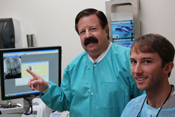|
By
Cindy Abole
Public Relations
MUSC's newest dental residency program is focused on preparing the
state's endodontic professionals. The program uses the latest
technology, research and clinical experience to train future
endodontists at the James B. Edwards College of Dental Medicine Dental
Clinical Education Center.
Endodontist Marc E.
Levitan, DDS, is the program's postgraduate director. He and his three
postgraduate endodontists can be considered dental heroes when it comes
to performing tooth-saving emergency techniques by diagnosing facial
pain and helping patients preserve their natural teeth. Mostly, they
enjoy the challenge that their work offers and the opportunity to teach
and promote good oral health among their patients.
 Drs. Marc Levitan, left, and Justin
McAbee review a digital X-ray of a patient's teeth during a procedure. Drs. Marc Levitan, left, and Justin
McAbee review a digital X-ray of a patient's teeth during a procedure.
Endodontists are root
canal specialists who are focused on managing pain, treating dental
injuries and preventing tooth loss using advanced technologies, skilled
techniques and procedures. Endodontists complete some additional years
of specialty training and education in diagnosis and root canal
treatment following graduation from dental school.
"Our goal was to build a
postgraduate endodontic program that could support the specialized
dental needs of South Carolina residents. As the state's only dental
school, we need to provide training programs in endodontics and other
dental specialties because all aspects of dentistry are becoming
intricate," said Levitan.
The program's three
endodontic residents are completing their first year of residency and
preparing to welcome a second group of residents. Current residents
include Justin McAbee, DMD, a spring 2010 MUSC dental alumnus; David
Woodard, DMD, a University of Missouri-Kansas City School of Dentistry
graduate; and Tom Heeren, DDS, who received his degree from the
University of Tennessee Health Science Center's College of Dentistry
and former U.S. Navy dentist.
According to Heeren, the
program operates successfully with a good balance between clinical
experiences, research work and the educational-teaching component.
"The program offers great
exposure to all aspects of endodontics," Heeren said.
A
flexible curriculum
MUSC's postgraduate endodontic program is a 26-month dental residency
that focuses on both clinical and research components. The didactic
component includes treatment planning, case review, literature review
and endodontic lecture presentations. Residents are expected to
complete a combined Master of Science in Dentistry (MSD) and
certificate program. A combined MSD and certificate program also is
available. Endodontic residents are expected to complete a research
project that includes a thesis defense and a publishable scientific
manuscript. Residents read and evaluate scientific literature, discover
resources and tools, plus test and review dental products to share
their findings at dental professional meetings across the country.
In addition to conducting
research, residents will guide senior-level dental students rotating in
the college's endodontics clinic also located at the dental clinical
education center. Additionally, endodontic postgraduate students teach
a new technologies course for second-year dental students and support
emergency clinic calls.
Levitan, who has more than
25 years clinical experience in clinical endodontics, approached CDM
Dean John Sanders, DMD, in 2006 to discuss plans for creating the
postgraduate endodontics program.
James A. Rivers, DMD,
professor and chair of the Department of Oral Rehabilitation, was
excited to develop the program following the recruitment of Levitan and
other dental faculty. Rivers tried to initiate the program in the
1980s, but the timing was not right. Instead, Rivers led the division
to move forward in other areas including dental technology, new
instruments and equipment that enhanced the school's undergraduate
endodontics clinical practice.
In 2009, the college
opened the dental clinical education center which expanded space and
opened collaboration to establish vital partnerships with dental
businesses and manufacturers to create the 120,000 square foot dental
education and research facility, according to Rivers.
"That building allowed us
to secure space in a modern facility and bring together modern dental
technology, practitioners and students to let us improve oral health
care in South Carolina," said Rivers.
Dental endodontics was
recognized as a dental specialty by the American Dental Association in
1963.
Levitan was recruited in
2006 from the University of Tennessee's School of Dentistry after
directing their endodontics program and establishing digital radiology
services within their program.
Tapping
technology, treatments
A year after observing and defining MUSC's endodontics program mission,
Levitan shared some foundational recommendations with Sanders and
dental leadership to enhance the clinical endodontics enterprise.
Levitan suggested the use of newer, more efficient technologies such as
digital X-ray imaging and new systems for treating patients. These were
technologies that Levitan previously used and introduced at Tennessee's
dental school. With the new digital imaging system, residents and
practitioners can take, process and view large, enhanced images in
seconds as opposed to traditional film X-rays that takes time to
process.
"New dental technology is
only beneficial if our students can be taught to utilize it when
treating patients. All of this enables us to provide patients with
better treatments and more predictable outcomes and fewer problems
associated with root canals and other endodontic procedures," Levitan
said.
At the dental school's
initial 2010 accreditation visit with the American Dental Association's
Commission on Dental Accreditation, accreditors were impressed with
their findings and progress of the postgraduate program. According to
Levitan, accreditors cited that MUSC's program was "ahead of the curve"
in dental technologies and other areas compared to other postgraduate
endodontics programs around the country.
Currently, Levitan and his
colleagues have completed the selection process for the program's
second group of residents. They will begin the program in June.
|



 Drs. Marc Levitan, left, and Justin
McAbee review a digital X-ray of a patient's teeth during a procedure.
Drs. Marc Levitan, left, and Justin
McAbee review a digital X-ray of a patient's teeth during a procedure.